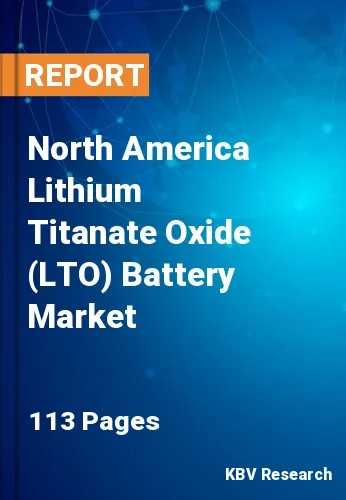The North America Lithium Titanate Oxide (LTO) Battery Market would witness market growth of 8.7% CAGR during the forecast period (2023-2030).
The lithium titanate oxide (LTO) battery market stands at the forefront of a transformative era in energy storage technology, poised to redefine how to harness, store, and utilize electrical energy. LTO batteries represent a class of advanced lithium-ion batteries that have garnered increasing attention and adoption in various applications. LTO batteries are rapidly gaining traction in electric vehicles due to their quick charging capabilities, extended lifespan, and robust thermal stability. These batteries are well-suited for high-power applications, making them a key player in the electrification of transportation.
Additionally, integrating LTO batteries with renewable energy sources, such as solar and wind, revolutionizes energy storage solutions. Their rapid charge and discharge rates ensure efficient capture and utilization of intermittent renewable energy, enhancing grid stability and reliability. LTO batteries are employed in grid energy storage systems to manage peak electricity demand, provide backup power during outages, and improve grid resilience. Their durability and safety features make them a valuable asset in grid management. LTO batteries find applications in various industrial and commercial sectors, including uninterruptible power supplies (UPS), forklifts, and material handling equipment, where reliability and safety are paramount.
Many states and utilities in North America have ambitious energy efficiency goals. LTO batteries are known for their energy efficiency, low self-discharge rates, and the ability to operate in extreme temperature conditions. These features make LTO-based energy storage solutions attractive for industries, businesses, and institutions looking to reduce energy consumption and enhance reliability, contributing to energy efficiency goals. EIA estimates that an additional 58.51 billion kWh (or about 0.06 trillion kWh) were generated with small-scale solar photovoltaic (PV) systems. In 2022, fossil fuels (coal, natural gas, and petroleum) in the United States accounted for about 60% of utility-scale electricity generation, nuclear energy made up about 18%, and renewable energy made up about 22%. Therefore, the growth in the power sector in North America will also boost the demand for LTO batteries in the region.
The US market dominated the North America Lithium Titanate Oxide (LTO) Battery Market, by Country in 2022, and would continue to be a dominant market till 2030; thereby, achieving a market value of $1,785.5 million by 2030. The Canada market is experiencing a CAGR of 11.2% during (2023 - 2030). Additionally, The Mexico market would exhibit a CAGR of 10.2% during (2023 - 2030).
Based on Capacity, the market is segmented into Above 10,000 mAh, 3,001–10,000 mAh and Below 3,000 mAh. Based on Application the market is segmented into Power, Aerospace, Marine, Industrial, Telecommunication, Automotive, Consumer Electronics and Medical. Based on Voltage, the market is segmented into High, Medium and Low. Based on countries, the market is segmented into U.S., Mexico, Canada, and Rest of North America.
Free Valuable Insights: The Lithium Titanate Oxide (LTO) Battery Market is Predict to reach $8.4 Billion by 2030, at a CAGR of 9.4%
The market research report covers the analysis of key stake holders of the market. Key companies profiled in the report include Toshiba Corporation, Targray Technology International Inc., Microvast Holdings, Inc., Nichicon Corporation, Leclanché S.A., Yinlong Energy International Pte Ltd (Gree Altairnano New Energy), Clarios, LLC. (Brookfield Business Partners), Zenaji Pty Ltd, Log9 Materials and LiTech Power Co., Ltd.
By Capacity
By Application
By Voltage
By Country
Our team of dedicated experts can provide you with attractive expansion opportunities for your business.

